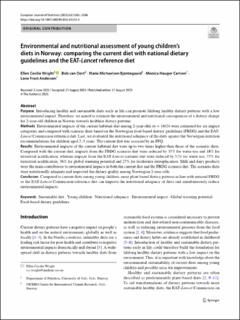Environmental and nutritional assessment of young children’s diets in Norway: comparing the current diet with national dietary guidelines and the EAT-Lancet reference diet
Wright, Ellen Cecilie; van Oort, Bob; Bjøntegaard, Marie Michaelsen; Carlsen, Monica Hauger; Andersen, Lene Frost
Peer reviewed, Journal article
Published version

Åpne
Permanent lenke
https://hdl.handle.net/11250/3120935Utgivelsesdato
2023Metadata
Vis full innførselSamlinger
- Journal articles [478]
Sammendrag
Purpose
Introducing healthy and sustainable diets early in life can promote lifelong healthy dietary patterns with a low environmental impact. Therefore, we aimed to estimate the environmental and nutritional consequences of a dietary change for 2-year-old children in Norway towards healthier dietary patterns.
Methods
Environmental impacts of the current habitual diet among 2-year-olds (n = 1413) were estimated for six impact categories and compared with scenario diets based on the Norwegian food-based dietary guidelines (FBDG) and the EAT-Lancet Commission reference diet. Last, we evaluated the nutritional adequacy of the diets against the Norwegian nutrition recommendations for children aged 2–5 years. The current diet was assessed by an FFQ.
Results
Environmental impacts of the current habitual diet were up to two times higher than those of the scenario diets. Compared with the current diet, impacts from the FBDG scenario diet were reduced by 35% for water use and 18% for terrestrial acidification, whereas impacts from the EAT-Lancet scenario diet were reduced by 51% for water use, 57% for terrestrial acidification, 36% for global warming potential and 27% for freshwater eutrophication. Milk and dairy products were the main contributors to environmental impacts in both the current diet and the FBDG scenario diet. The scenario diets were nutritionally adequate and improved the dietary quality among Norwegian 2-year-olds.
Conclusion
Compared to current diets among young children, more plant-based dietary patterns in line with national FBDG or the EAT-Lancet Commission reference diet can improve the nutritional adequacy of diets and simultaneously reduce environmental impacts.
